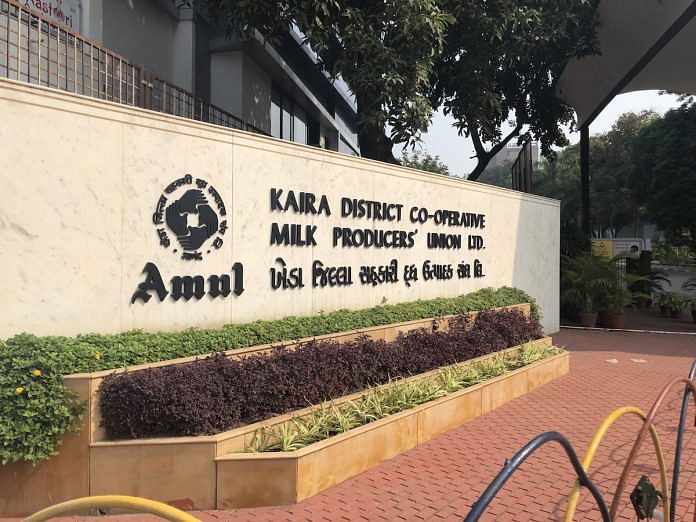Party chief Amit Shah has devised a strategy to use the state’s milk cooperatives to increase its rural reach and break a traditional Congress stronghold.
Anand/Kheda districts, Gujarat: Keeping with its strategy of tapping every available network to woo voters, the BJP’s election machine in Gujarat has for the first time made widespread, systematic use of the multi-armed milk cooperatives in the state.
This has become possible because the party now has absolute control over the largest milk cooperative, Amul, a shift from the past when this movement was linked to the Congress and considered to be its turf. The federation has 18 milk unions, and politicians affiliated to the BJP now control each of these 18. In August, the last non-BJP chairman, Ramsinh Parmar of the Kaira milk cooperative, left the Congress to join the BJP, and with that, the transition was complete.
The state has 18,000 villages, each of which has its own ‘mandali’ or society. These societies are involved in milk procurement, micro-finance and providing agricultural inputs to farmers, and thus link up to cooperatives like Amul and NABARD. While each society has a certain number of office bearers, its influence comes through the hundreds of people in villages who are directly or indirectly involved with them. Villagers employed in animal husbandry supply milk to these cooperatives.
“Earlier, cooperatives and elections were never directly mixed. But this time, the BJP has tried this experiment of running a campaign through cooperatives – to get more people to vote, and to convince them about the good work done by the BJP,” says Tejash Patel, APMC chairman in Petlad, and director of Amul, based in Anand.
Each assembly constituency has around 200 booths. Those involved with cooperatives explain that in each booth, one person from the corresponding village mandali has been given charge of reaching out to voters. The party is playing on the fact that the chairman of the mandali in villages is powerful and commands a following.
“This is a micro-level operation, and is not visible on the surface. It is entirely a ground level interface. BJP president Amit Shah is the one who devised this strategy, and is monitoring it closely. His 150-seat target was also based on a wide network like this,” says a senior member of one of the 18 milk unions, who does not wish to be identified.
“If the party does well, a lot of credit would go to such a well-oiled operation. As of now, we feel about 70 per cent of village mandali chairpersons are with us.”
On the ground, wherever the milk society head is supportive towards the BJP, this strategy seems to be going according to plan.
Neeruben, secretary of the milk society in Padgol village (Petlad assembly constituency) of Anand district, says she tries to explain to the villagers how the BJP had helped them. “I tell the villagers, who congregate in the mandali every morning and evening to deposit milk, what the BJP has done for the village, be it roads or water and power supply,” she says.
“I tell women how Modi ji has made the state safe for them, while also ensuring easier availability of loans for them. I ask them what is lacking in the BJP’s work, and tell them I will convey it to the leaders. If they accuse the BJP of corruption, I explain how it is the lower tiers that are not allowing benefits to flow down. Demonetisation has been a major concern, so I tell villagers how it didn’t hurt us, but those with black money,” she adds.

Neeruben says there was a committee meeting on 1 December when they were all asked about the progress with voters. “If someone is veering towards the Congress, I try and convince them about why BJP is better,” she says.
In Valetva village in Nadiad assembly constituency of Kheda district, sarpanch and milk society member Bhanubhai Solanki says he “convinces villagers about BJP’s vikas model”.
“Earlier our village had more Congress affiliations, but because of our efforts through the mandali, now 65 per cent are in BJP’s favour. I was also pro-Congress earlier, but a few years ago, seeing the BJP government’s good work, I became pro-BJP,” Solanki says.
Akhdol village in Kheda district has about 6,000 residents, 800 of whom are involved with the cooperative.
“We do both door-to-door campaigns, as well as hold meetings every two or three days. The Congress held sway in our village earlier, but we have gradually changed that,” says Prafullbhai Parmar, village sarpanch and milk society chairman.
“In the recent taluka election, our village didn’t do well for the BJP, so we asked villagers what they needed and what hadn’t been done. This was then conveyed to the leadership, and amendments made. That is how we operate. Now we are convinced most villagers are pro-BJP.”



